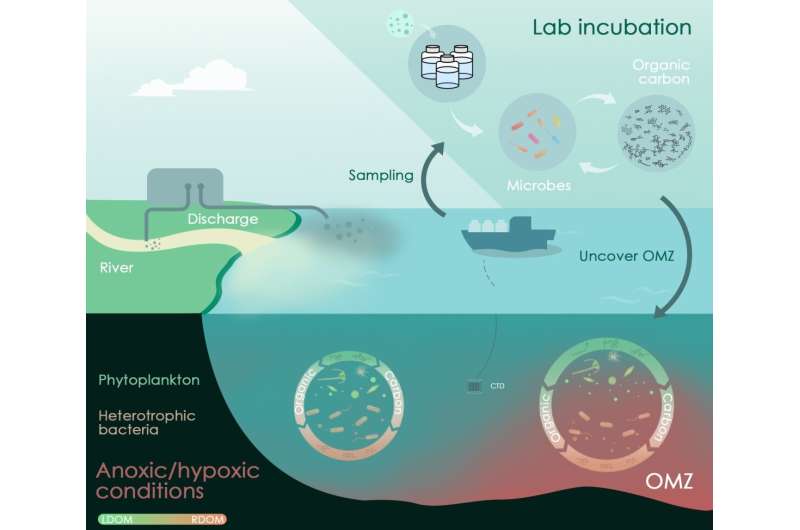How a hypoxic environment is conducive to organic carbon storage in the coastal ecosystem

Recently, Science China Earth Sciences published a paper about the transformation of organic matter by microorganisms under anoxic/hypoxic conditions. With the intensification of water eutrophication and global warming, hypoxia occurs frequently in coastal waters. In this study, the researchers performed an experiment to investigate changes in microbial community and the molecular characteristics of dissolved organic matter (DOM) under hypoxic conditions.
Microbial-mediated DOM transformation was compared in different media (natural and artificial seawater with and without laminarin) at different dissolved oxygen levels (7, 5, and 2 mg L−1). They also investigated differences in DOM composition among groups using spectroscopic analysis and ultrahigh-resolution Fourier transform ion cyclotron resonance mass spectrometry (FT-ICR MS). The experiments shed light on the interactions between microorganisms and DOM, as well as processes and mechanisms of DOM preservation in the hypoxic coastal ecosystem.
The researchers found that microbial community structure and molecular characteristics of DOM were obviously different between hypoxic group (O2−1) and the other two experimental groups (O2=5 or 7 mg L−1). The utilization rate of total organic carbon (TOC) by microorganisms was decreased by 36.9%~46.7% under hypoxic condition.
The growth of strictly aerobic bacterial groups such as Pseudomonas and Sphingomonas was inhibited, and Rhodobacteraceae can thoroughly degrade available organic matter and maintain relatively high abundance until the end of the experiment. Protein-like fluorescent DOM components such as tyrosine and tryptophan were preserved, while DOM humification was significantly decreased under low oxygen conditions.
The percentage of S-containing DOM molecules was significantly higher in hypoxic group than the other oxygen concentration groups. The molecular aromaticity index (representing refractory degree) of DOM decreased significantly under the hypoxic conditions. The experimental results showed that deceasing microbial activity and community succession resulted in the preservation of labile organic matter under the hypoxic conditions.
The researchers predict that more labile organic matter will be stored in coastal waters or buried in sediments when hypoxic regions expand due to global warming and eutrophication. The responses of microbial communities to low oxygen concentration and the effects of hypoxia on DOM composition may provide important negative feedback regulation in marine carbon cycle and global climate change.
More information:
Shicong Xiao et al, Molecular characterization of organic matter transformation mediated by microorganisms under anoxic/hypoxic conditions, Science China Earth Sciences (2023). DOI: 10.1007/s11430-022-1080-8
Citation:
How a hypoxic environment is conducive to organic carbon storage in the coastal ecosystem (2023, April 27)
retrieved 27 April 2023
from https://phys.org/news/2023-04-hypoxic-environment-conducive-carbon-storage.html
This document is subject to copyright. Apart from any fair dealing for the purpose of private study or research, no
part may be reproduced without the written permission. The content is provided for information purposes only.
For all the latest Science News Click Here
For the latest news and updates, follow us on Google News.

